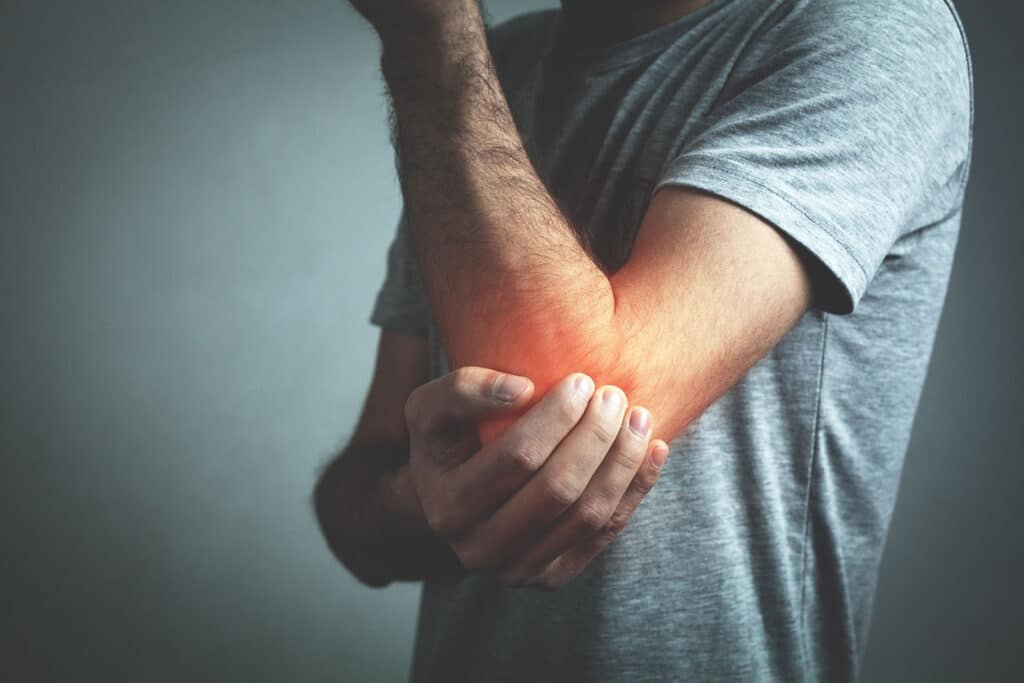Why Do My Joints Hurt After I Drink?
You may have noticed that you often feel discomfort in your joints and muscles after a night of heavy drinking. This is not a coincidence, nor a sign of aging. Alcohol damages every part of your body, and your musculoskeletal system is no exception. Understanding how heavy drinking can damage your body is essential, so keep reading to learn more about alcohol’s effects on your joints and muscles.

How Alcohol Causes Joint and Muscle Pain
Did you know that large amounts of alcohol consumption can negatively affect your overall physical health? One of the negative effects of alcohol is an increased risk of developing muscle and joint pain. How does that exactly happen? Here’s what you should know.
Inflammation
Inflammation is the body’s natural immune response to injury and sickness. When your immune system triggers the inflammatory response, various cells rush through your body to fight pathogens and repair damaged tissue.
As a result of this process, the affected tissue becomes swollen and uncomfortable. Because alcohol suppresses your immune system, your entire body will become inflamed after a night of heavy drinking. Common symptoms of inflammation include joint pain, fever, headache, swollen eyes, muscle weakness, acne breakouts, and fatigue.
Increased Uric Acid
Even moderate amounts of alcohol increase uric acid levels. What does this mean? Gout flare-ups can be expected. Alcohol increases the breakdown of purine, which then leads to increased uric acid levels. Gout is a medical condition in a form of an inflammatory disease that affects the joints, specifically the big toe. This is one of the common causes of joint pain because of drinking. What is the consequence? It’s too painful to walk or even to drive.
Dehydration
Alcohol is a diuretic that expels water from all of your body’s tissues. This is why people frequently urinate when they drink alcohol. Water is an essential component in the natural lubricant between your joints.
Thus, without enough water in your system, there will be greater friction between the bones and connective tissues that your joints are supposed to lubricate. Not only is this friction painful, but it can also cause permanent damage, chronic pain, and reduced functionality.
Low-Quality Sleep
Under normal circumstances, your body is supposed to repair itself while you sleep. However, alcohol severely impedes the brain’s ability to initiate a complete sleep cycle, so your body does not get the brain signals necessary to fix your joints and other damaged tissues after a night of drinking. Even a single drink in the evening can severely impact the quality of your sleep, so individuals who struggle with alcohol addiction often experience chronic joint pain.
Diminished Muscle Recovery
Proper protein synthesis is vital for your muscles to recover from exercise, injuries, and normal wear and tear. Alcohol prevents your digestive system from entirely breaking down protein and other important nutrients and distributing them to your muscles. Consequently, alcoholics cannot easily maintain muscle mass and often have sore muscles.
Overexertion and Poor Coordination
Drinking severely reduces a person’s balance and coordination. Because of this, intoxicated individuals stumble around and walk more forcefully than usual. Heavy steps and awkward movements can put a lot of pressure on a person’s joints and contort them in unhealthy ways.
On top of that, people often dance and engage in other strenuous physical activities for extended periods when they drink. Thus, while heavy drinking will negatively affect your joints, it’s awful for your knees, hips, and ankles.
How Are Joint and Muscle Pains Relieved?
Health conditions like joint and muscle pain can be relieved through over-the-counter medications like non-steroidal anti-inflammatory drugs (NSAIDS) such as Ibuprofen, acetaminophen, and naproxen. However, these medications are for temporary pain relief only.
Do you want to sacrifice your quality of life because of alcohol? To avoid all muscle pains and gout, the main treatment regimen is by stopping the intake of alcohol. No matter how many medications you take, if you still drink alcohol, the pain will just recur.

Signs of Alcohol Addiction
At first, you may think a couple of alcoholic drinks or a glass of wine are just harmless. Moderate drinking does not hurt. But as time goes by, when a person drinks more amounts of alcohol, it starts to take take a toll on their physical health.
This is when alcohol abuse starts and the negative effects start to kick in. The consequences? Liver damage, rheumatoid arthritis, ulcers, gout attacks, autoimmune conditions, and plenty of other health problems could be irreversible in the long run.
So where do you draw the line between drinking small amounts of alcohol and alcohol abuse? If you’re worried about a loved one going down that dark path, here are the signs of alcohol use disorder you should look out for. Once you notice these signs, enlist help right away to put a stop to this.
Mood Swings
Individuals who struggle with alcohol addiction typically cycle between euphoria, anxiety, anger, depression, and other extreme feelings. When a person is under the influence of alcohol, they are more likely to experience heightened emotions and exhibit abnormal aggression. Because alcohol is a depressant, alcoholics often feel despair and low self-worth between doses.
Career Problems
Most employers do not tolerate workplace intoxication. Even if an alcoholic doesn’t drink at work, they may call out when drunk, skip work to go out drinking with friends or take a sick day when they have a hangover. Missing work for any of these reasons is a big sign of a drinking problem.
Regular Sickness
Drinking can seriously limit the body’s ability to fight off infections. Because of this, many alcoholics regularly suffer from colds, the flu, and other seasonal viruses. Quitting alcohol will strengthen your immune system and allow you to live a more comfortable life.
Forgetfulness
Can alcohol cause forgetfulness? Breaking news, it does! Alcohol can prevent the brain from fully forming memories. This is why individuals who struggle with alcohol addiction can have such a hard time recalling their actions.
Sometimes, people drink too much and end up in jail for crimes they cannot remember committing. Blacking out can be incredibly dangerous, so you should seek treatment at a reputable addiction recovery center if heavy drinking has affected your memory.
Driving Under the Influence of Alcohol
Many alcoholics constantly have alcohol in their system, so they’re much more likely to get behind the wheel while intoxicated. Depending on your weight and metabolism, a single drink could put you over the legal limit.
There’s a good chance that you’ll get a DUI charge if a police officer stops you and tests you while you have alcohol in your system. Because a DUI can cost thousands of dollars and impact a person’s ability to get a job, people who don’t struggle with alcohol addiction usually do everything they can to avoid drinking and driving.
If you find it difficult to avoid drinking and driving, then you need to enroll in an addiction treatment program as soon as possible. Otherwise, you might hurt yourself or an innocent person.
How To Detox Safely
Unfortunately, quitting alcohol can have some dangerous short-term side effects. Alcohol withdrawal symptoms start within 12 hours of a person’s last drink. Early withdrawal symptoms include shaking, irritability, aches and pains, sweating, heart palpitations, depression, and anxiety. The worst symptoms typically appear within three to five days after a person’s final dose.
At this stage in the detox process, patients may experience delirium, seizures, hallucinations, and other intense symptoms. Symptoms become more manageable once a patient makes it through this dangerous period.
It’s impossible to live typical life as you go through the early stages of the detox process. A seizure or delirium without proper medical supervision can easily lead to death. Withdrawal-induced seizures and delirium cause hundreds of deaths in the United States annually.
With this, so you should consider enrolling in a reputable detox program to mitigate the risks associated with the most dangerous withdrawal symptoms. With qualified medical staff and the best addiction specialists on standby, a good addiction treatment center will make the detox process as safe and comfortable as possible.
What To Expect From an Addiction Treatment Program
You will have difficulty maintaining long-term sobriety without the right skills, knowledge, and coping mechanisms. This is why you must continue your addiction treatment once you get through the detox process. Most patients start with residential addiction treatment.
During your time in an inpatient program, you will stay at the treatment center as you attend therapy sessions, share your struggles with peers in group sessions, learn how to sustain a sober lifestyle, make arrangements for your life after treatment, and engage in a wide array of healthy activities.
Once your residential stay is over, you will spend your nights at home and commute to the recovery center for individual therapy and other treatments multiple times per week. After some time, you’ll no longer need treatment at an addiction recovery center. Instead, you’ll regularly meet with a local recovery support group.
Don’t Wait To Seek Addiction Treatment
Living life to the fullest when you’re struggling with addiction is impossible. While intoxication may feel nice, alcohol will severely damage your mind, body, relationships, and self-esteem. Thankfully, there’s a way to break alcohol’s grip on your life. Mid Hudson Addiction Recovery professionals want to help you overcome your addiction, so you should contact us today to learn more about the best treatment programs in New York.

